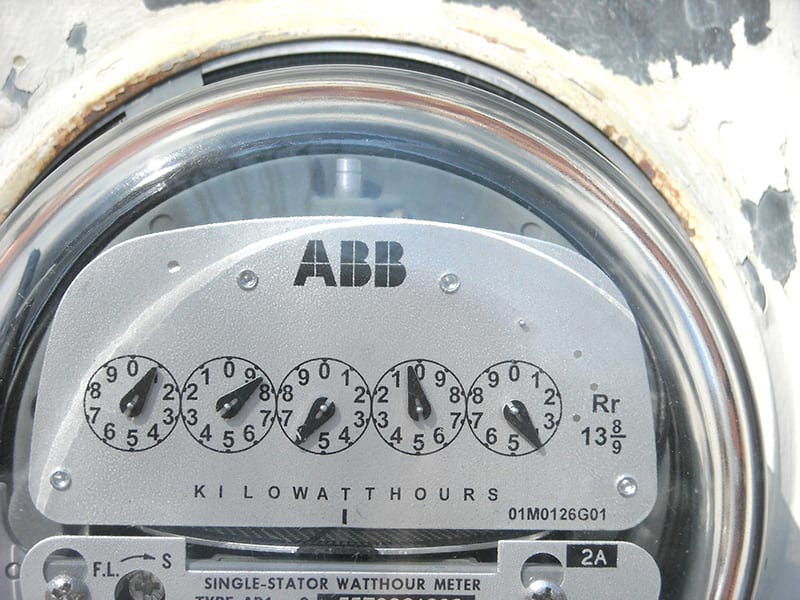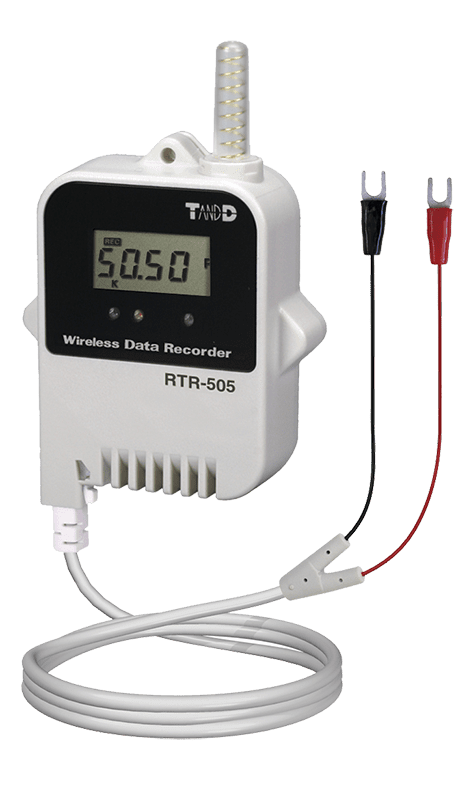T&D RTR 505-P Connect with a Broad Range of Meters
 CAS DataLoggers supplied the wireless data logging solution for an HVAC contractor who needed to perform power monitoring for their client’s 25 HVAC systems installed in a strip mall. The owner began searching for a compact yet cost-effective data logging device that could connect to most commercially-available power meters to measure the pulse output. Anticipating an additional request to monitor the mall’s temperature and humidity, the contractor also needed this device to be compatible with other data logging models to measure other parameters including the temperature in a duct, the humidity of the airstream coming out of an air handler, etc. This HVAC monitoring equipment would also need wireless communication to provide adequate coverage in out-of-the-way spots and would have to support handheld data collection to save workers the time of checking each device manually, which would be too time-consuming to keep their appointments with other clients and projects.
CAS DataLoggers supplied the wireless data logging solution for an HVAC contractor who needed to perform power monitoring for their client’s 25 HVAC systems installed in a strip mall. The owner began searching for a compact yet cost-effective data logging device that could connect to most commercially-available power meters to measure the pulse output. Anticipating an additional request to monitor the mall’s temperature and humidity, the contractor also needed this device to be compatible with other data logging models to measure other parameters including the temperature in a duct, the humidity of the airstream coming out of an air handler, etc. This HVAC monitoring equipment would also need wireless communication to provide adequate coverage in out-of-the-way spots and would have to support handheld data collection to save workers the time of checking each device manually, which would be too time-consuming to keep their appointments with other clients and projects.
Installation
The contractor installed 5 T&D RTR-505-P Wireless Pulse Data Loggers to monitor the mall’s HVAC system energy usage using the pulse output, connecting them to energy meters via several Continental Control Systems WattNode WNC-P devices to work with the data loggers to give users 1 pulse per every watt-hour. Additionally, a T&D TR-57DCi Handheld Data Collector was chosen for fast data retrieval. T&D RTR-505-P wireless loggers recorded pulse output taken from the mall’s power meters, enabling cost-effective power monitoring–every hour users saw the energy consumption over the previous hour. Users could scale the data into meaningful units. Using the data loggers’ software, users converted the pulses back into energy to view kilowatt-hours as a result. Workers could easily combine the 505-P with other T&D data loggers, placing them in heating ducts and attaching them to air handlers to measure other parameters including temperature and humidity, giving the contractor a comprehensive HVAC monitoring system with the flexibility to handle several different applications.
Usage
 The compact T&D pulse data loggers were designed to record the changes in pulse count for contact signals (such as switches, relays, and thermostats) and Lo/Hi voltage signals that occurred during a defined recording interval. The devices were capable of recording the total pulse count from the start of recording and also allowed for a variety of commercially available sensors to be connected to the included input module, widening the range of possible applications without workers having to travel back to change Base Units.
The compact T&D pulse data loggers were designed to record the changes in pulse count for contact signals (such as switches, relays, and thermostats) and Lo/Hi voltage signals that occurred during a defined recording interval. The devices were capable of recording the total pulse count from the start of recording and also allowed for a variety of commercially available sensors to be connected to the included input module, widening the range of possible applications without workers having to travel back to change Base Units.
Measuring voltage signals from 0 to 27V with a pulse response with a low of 0.5V or less, high of 2.5V or more, and maximum pulse response of 3,500 pulses per second, the data loggers featured a large 16,000 reading storage capacity to keep logging for extended periods. Capable of counting up to 61,439 pulses per reading, the loggers’ clear LCD displays showed current readings along with status, logging capacity, measurement range exceeded, and more, and the data loggers also offered options for wall mounts to make installation easy.
The T&D data loggers offered convenient data accessibility–it was simple to instantly download all the data via wireless communication using an RTR-500nw Base Unit. The wireless communication range between a Remote Unit and a Base Unit was about 500 feet (150 meters), and this range was easily extended by simply registering an RTR-500 as a Repeater to expand coverage. The data logger’s large logging capacity of up to 16,000 readings allowed users to set a recording interval of once an hour and keep monitoring for 665 days. It only took about two minutes for a Base Unit to finish wirelessly downloading one RTR-505 Remote Unit at full logging capacity. Data could also be collected remotely via USB and LAN with other available base units.
Utilizing a low energy consumption design, the data loggers’ lithium batteries had an estimated battery life of about 10 months operating at normal temperatures. If the contractor needed to extend the logging duration, T&D “L” model loggers featured a large capacity battery pack so that under the same conditions they could continue for about four years to save workers the trouble of replacing the battery.
Using the T&D handheld data collector, workers simply collected all the data from as far back as the parking lot, gathering and checking recorded data on the spot without having to waste time manually gathering the data loggers. Recording settings such as “Recording Interval” and “Recording Start” could also be made directly from the TR-57DCi into the loggers. Compatible with the majority of T&D data loggers, the data collector stored an impressive 256,000 readings with a battery life of about 100 days at 1 hour of daily use. The collector’s LCD display featured useful functions for quickly thumbing through the data. The T&D data collector could also communicate with a PC via USB to offload data to the computer.
Benefits
The contractor benefited in several ways following the installation of the T&D RTR-505-P wireless pulse data loggers. This HVAC monitoring equipment connected with a broad range of power meters. When workers needed to monitor other parameters such as temperature and humidity, other T&D loggers could easily be inserted in the mall’s heating ducts and attached to air handlers to provide a comprehensive monitoring system with the versatility to measure whatever the client requested. Data collection and organization was a snap with the loggers’ wireless capability and the handheld data collector.
For more information on TandD Data Loggers, HVAC monitoring equipment, or to find the ideal solution for your application-specific needs, contact a CAS DataLogger Application Specialist at (800) 956-4437 or request more information.

